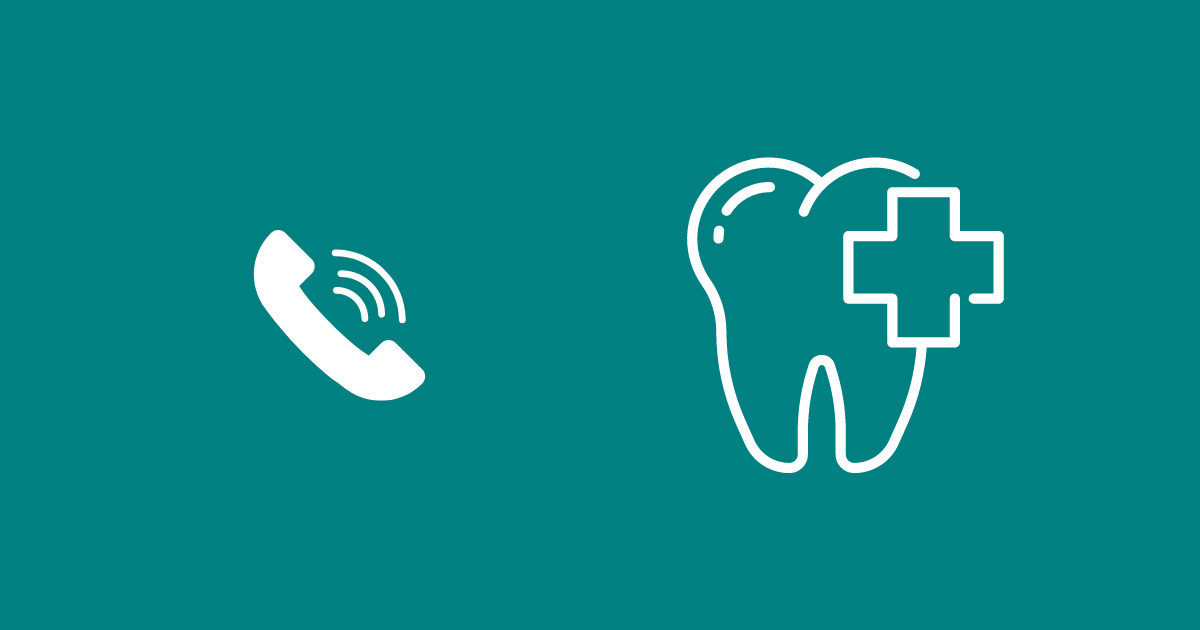How do I find an emergency dentist near me?
This is the most common question for all dental patients.
Dental emergencies, such as severe toothaches, bleeding gums, or knocked-out teeth, demand immediate attention. Knowing how to find a professional emergency dentist quickly can prevent further complications, save your teeth, and alleviate your discomfort. It’s important to understand that not all dental issues qualify as emergencies. If you’re unsure, contact your regular dentist for advice. In this article, I will share some important information about finding an emergency dentist near me, I mean near you. Let’s dive into the details.
Find an Emergency Dentist Near Me: 5 Steps
These simple and must-follow 5 steps will help you find the best emergency dentist near you.
Step 1: Contact Your Regular Dentist
Your regular dentist is the first place to turn to. Even if they don’t offer emergency services themselves, they might provide referrals to trusted colleagues who do or have an after-hours answering service for urgent situations.
Why start with your regular dentist?
- Familiarity: Your regular dentist knows your dental history, any existing conditions, and your overall oral health needs. This knowledge allows them to best assess the urgency of your situation and provide appropriate guidance.
- Continuity of Care: Even if they cannot personally handle the emergency, your dentist can ensure seamless treatment by referring you to a trusted colleague who can access your records.
- After-Hours Support: Many dental offices, even if they don’t advertise as emergency clinics, have an answering service or emergency line for urgent situations outside of regular hours.
- Insurance Networks: Your dentist is likely in your insurance network, potentially minimizing out-of-pocket costs if they handle the emergency or refer you to another in-network provider.
How to make contact
- Phone: Call the regular office number first. There might be instructions on an answering service or voicemail on how to proceed in an emergency.
- Office Website/Patient Portal: Some dental practices have online resources or patient portals with information on emergency procedures.
- Direct Contact: If you have a personal relationship with your dentist or their staff, you might have a direct emergency contact number for them.
Important Note: Even if you’re unsure whether your situation qualifies as a true emergency, contact your regular dentist’s office. They can help you assess the severity and guide you to the most appropriate course of action.
Step 2: Search Online
Several websites can help you locate emergency dentists.
Key websites to utilize
- American Dental Association (ADA) Find-a-Dentist: This tool from a trusted national organization allows you to search for dentists in your area and filter for those who offer emergency care.
- Local Dental Society Websites: Websites of your city or state’s dental society often maintain a list of member dentists, including those specializing in emergency treatments.
- General Search Engines: Using a search engine with phrases like “emergency dentist near me + [your location]” can yield helpful directory listings and local practice websites.
Why searching online is a great option?
- Speed and Accessibility: Online resources are available 24/7, offering immediate help when you need it most.
- Targeted Results: Specialized dental websites allow you to filter results by location, emergency services, and other relevant criteria.
- Wide Range of Options: You’re likely to find a broader selection of emergency dentists online compared to relying solely on personal recommendations.
- Reviews and Information: Many websites include patient reviews and additional information about dental practices, helping you make an informed decision.
Tips for effective online searches
- Be Specific: Include your city, neighborhood, or zip code to get the most relevant results.
- Use Keywords: Try variations like “24-hour emergency dentist,” “urgent dental care,” or “weekend dental emergency.”
- Check Reviews: Look for positive patient feedback and testimonials, especially about the dentist’s handling of emergency situations.
Step 3: Utilize Your Network
Don’t underestimate word-of-mouth. Ask your family, friends, or coworkers if they have any recommendations for emergency dentists. Even your pharmacist might have helpful contacts. Here are some guidelines:
- Personal Recommendations: People you trust – family, friends, coworkers – can provide valuable information based on their own positive experiences with emergency dentists.
- Word-of-Mouth Reliability: First-hand accounts can offer insights into a dentist’s demeanor, emergency handling skills, and overall patient experience, which may not be readily apparent on websites.
- Unexpected Sources: Even people you wouldn’t immediately think of, such as your pharmacist, might have connections to or knowledge of local emergency dental providers.
Who to ask within your network
- Family and Friends: Those who live in your area are the most likely to have relevant recommendations.
- Coworkers: This is especially helpful if you’re new to a location or don’t have a strong local network yet.
- Neighbors: They may have recommendations for nearby dental practices with emergency services.
- Pharmacist: Pharmacists often interact with healthcare providers and might be aware of emergency dentists in your community
Tips for getting the best recommendations
- Be Clear: Briefly explain your specific emergency situation. This will help people recommend a dentist who can address your needs.
- Ask Questions: Find out what they liked about their experience with the recommended dentist. Did they have a positive emergency visit? Was the dentist reassuring and efficient?
- Consider Your Needs: If you have specific concerns, like dental anxiety or cost limitations, mention these when asking for recommendations.
Important Note: While network recommendations are valuable, always verify that the suggested dentist can address your current emergency, accepts your insurance (if applicable), and is available for your time frame.
Step 4: Contact a Local Hospital
Sometimes, reaching out to your local hospital is a viable option when seeking emergency dental care. Hospitals might have an on-site dental clinic equipped to handle urgent situations. Even if they don’t offer direct dental treatment, the hospital staff could provide you with reliable referrals to dentists or emergency dental clinics in your area. This is particularly helpful if your emergency occurs outside of regular office hours or you have trouble finding an available emergency dentist through other resources. When contacting a hospital, be sure to clearly explain your dental emergency and ask if they provide on-site dental care or have a list of recommended providers.
Step 5: Use a Dental Hotline
Depending on where you live, there might be a dental hotline available specifically designed to connect people with dental emergencies to appropriate care. These hotlines are often run by local dental societies or community health organizations. When you call a dental hotline, they’ll assess your situation and provide you with contact information for emergency dentists in your area who can address your specific needs. This can be a very helpful resource, especially if you’re struggling to find help through other methods or need assistance navigating potentially complex after-hours emergency care systems.
Questions to Ask an Emergency Dentist
Ask these questions before your appointment to make the most of your time and avoid unnecessary financial surprises during an emergency.
Questions to address:
- Insurance Coverage:
- “Do you accept my dental insurance?” This is often the most important factor in determining out-of-pocket expenses.
- If they don’t, ask if they offer payment plans or assistance in filing insurance claims after emergency treatment.
- Fees and Payment:
- “What are your fees for emergency care?” Have a general idea of costs upfront.
- “Do you offer any payment (pricing) plans or financing options?” This is especially important for those without insurance or with high out-of-pocket costs.
- Availability:
- “How soon can you see me?” Ensure they have a timely appointment for your situation.
- Expertise:
- “Can you treat my specific dental emergency?” Not every dentist is equipped to handle all types of emergencies (e.g., complex tooth extractions, facial trauma).
- Hours:
- “What are your hours of operation, and do you offer after-hours or weekend emergency appointments?” This is vital if your emergency occurs outside of typical business hours.
Additional Considerations:
- Communication: Briefly state your dental emergency and see if the dentist sounds knowledgeable and confident in addressing it.
- Comfort Level: If the person on the phone is dismissive or unhelpful, it might be a sign to seek care elsewhere.
- Record-Keeping: Keep track of who you speak to, the time of the call, and the answers to your questions for future reference.
Key Takeaway: Don’t be afraid to shop around and compare a few emergency dentists before committing. Your goal is to find a provider who can handle your emergency, aligns with your insurance or financial situation, and is available when you need them.
Tips for Preparing for an Emergency Dental Visit
While your priority is finding an emergency dentist quickly, a few simple steps can significantly improve your experience and potentially influence the outcome of your treatment.
Key Actions to Take
- Gather Insurance Information:
- Have your insurance card and policy information ready. This will streamline the process and help the dental office determine your coverage and estimated costs.
- Retrieve Fragments:
- If you have a knocked-out tooth:
- Find the tooth and handle it only by the crown (the top chewing part).
- If dirty, gently rinse it with milk or saline without scrubbing.
- If possible, immediately place the tooth back into its socket. If not, store it in milk or saliva and bring it to your emergency appointment.
- For broken teeth or restorations: Collect any pieces you can find and bring them with you.
- Clear Communication:
- When contacting the emergency dentist’s office, be ready to explain:
- What happened (e.g., fall, sports injury, broken tooth)
- The level of pain or discomfort you’re experiencing.
- Any bleeding or swelling.
Benefits of Preparation
- Faster Treatment: Providing your insurance information upfront or bringing a lost tooth with you can speed up the treatment process.
- Saving Your Tooth: Acting quickly and handling a knocked-out tooth correctly increases the chances of successful reimplantation.
- Informed Decision-Making: Knowing your potential costs (based on insurance coverage) helps you prepare financially.
- Reduced Stress: Being organized takes some of the anxiety out of an already overwhelming situation.
Important Note: Even if you can’t do everything perfectly in an emergency, don’t let that delay seeking help. The most important thing is getting to the emergency dentist as quickly as possible.
Prevention is Key
While the article mainly focuses on finding help during a dental emergency, highlighting prevention emphasizes the long-term benefits of proactive oral care.
Key Prevention Strategies
- Regular Dental Checkups:
- Scheduling dental cleanings and exams every six (6) months is crucial.
- This lets your dentist spot potential problems early when they’re easier and less costly to treat, avoiding major emergencies later.
- Good Oral Hygiene:
- Brushing twice daily with fluoride toothpaste: Reduces plaque buildup, the primary cause of cavities and gum disease.
- Flossing daily: Reaches areas your toothbrush can’t, removing bacteria and food debris between teeth.
- Using an antiseptic mouthwash Provides additional protection against harmful bacteria.
- Wear a Mouthguard:
- To protect your teeth from damage, always wear a mouthguard during contact sports or high-risk activities.
- A mouthguard absorbs impact, protecting teeth from chips, fractures, or being knocked out.
Benefits of Prevention
- Fewer Emergencies: With good oral health, you drastically reduce your risk of serious issues requiring urgent care.
- Healthier Smile: Preventing tooth decay, gum disease, and injuries keep your smile healthy and beautiful.
- Cost Savings: Preventive care is far less expensive than emergency treatments, saving you money in the long run.
- Overall Well-being: Oral health is linked to your general health. Preventing dental problems helps protect your whole body.
The Takeaway: While you can’t prevent every unforeseen circumstance, investing in preventive dental care empowers you to minimize the likelihood of emergencies and maintain a healthy smile for life.
FAQs: Emergency Dentist Near Me
Q: What counts as a dental emergency?
A: True dental emergencies generally include:
- Severe, uncontrolled tooth pain
- Knocked-out tooth
- Broken or fractured tooth exposing the nerve
- Significant bleeding from the mouth
- Swelling of the face or jaw
- Trauma or injury to the teeth, gums, or mouth
Q: Can I wait to see my regular dentist if it’s not an emergency?
A: In most cases, yes. If you’re experiencing mild tooth sensitivity, a chipped tooth without pain, or a lost filling, it’s usually okay to schedule an appointment with your regular dentist during their normal hours.
Q: What if I don’t have dental insurance?
A: Don’t let lack of insurance prevent you from seeking care. When calling potential emergency dentists:
- Ask about fees and payment plans.
- Inquire about any sliding-scale fees based on income.
- Some dental schools or community clinics offer low-cost or free emergency care.
Q: What if the emergency happens after hours?
A:
- Many emergency dentists offer extended or weekend hours.
- Check if your regular dentist has an emergency answering service.
- Hospitals may provide referrals for after-hours dental care.
Q: Should I go to the hospital emergency room for a dental emergency? A: Typically, a hospital ER is not the ideal place for dental emergencies unless there’s significant facial trauma or uncontrolled bleeding. Emergency dentists are better equipped to handle tooth-specific issues.
Conclusion
Understanding how to find an emergency dentist near you will save you time and stress when faced with an unexpected dental crisis. By following the steps outlined in this article, you’ll be equipped to find an emergency dentist near me and receive the prompt treatment you need. Remember, prevention is always the best approach, so prioritize regular dental visits and maintain excellent oral hygiene habits. Should the unexpected happen, don’t hesitate to seek help– your smile depends on it!




